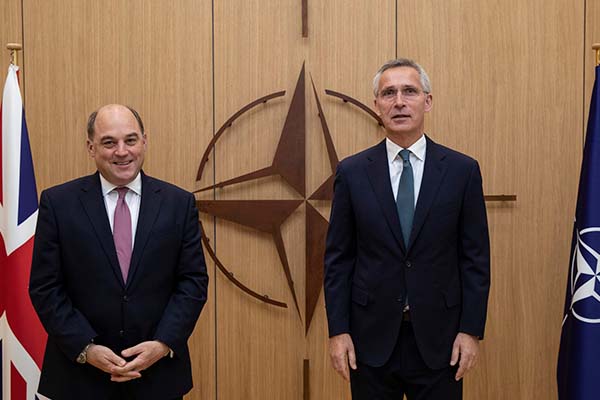Analysis
The discussions around NATO’s new Strategic Concept coincide with a new chapter in the UK’s own foreign and defence policy, as the country redefines its priorities in the post-Brexit era and in a rapidly changing geostrategic environment. The British vision for the future of NATO is anchored in the long-term trends and priorities outlined in two key strategy documents published this year. The 2021 ‘Integrated Review of Security, Defence, Development and Foreign Policy’ and the Defence Command Paper set out Global Britain’s ambitions and its approach to Euro-Atlantic security.
Supported by a significant increase in the defence budget, the UK aims to refocus its armed forces on high-end capabilities enabled by data and digital technologies, with a reduction in the overall size of the regular army. Although it aims to maintain full-spectrum capabilities, it will prioritise the development and integration of new technologies (embracing newer domains like cyber and space) to enable multi-domain operations and interoperability with partners.
At a pivotal moment for both the UK and NATO, London’s main objective for the new Strategic Concept is to modernise defence in a competitive age while reaffirming the centrality of the Alliance.
(1) Redefining British leadership in the Alliance?
Just like previous strategy documents, the 2021 Integrated Reviewplaces NATO at the heart of British defence policy and planning. It firmly anchors the British defence posture in its home region of the Euro-Atlantic, with Russia defined as ‘the most acute threat in the region’. The stability of the Euro-Atlantic area is presented as a precondition for London’s ‘Indo-Pacific tilt’ –the UK’s ambition to deepen its engagement and presence in the Indo-Pacific region for economic and security reasons–. Despite recent public doubts over the state of NATO (particularly during the Trump Presidency and in the aftermath of the fall of Kabul), the Alliance is still a reference point for the British public, armed forces and policymakers alike.
Following the British exit from the EU, and in the absence of a structured basis for foreign, security and defence cooperation with the EU, the priority for London has been to emphasise policy continuity by doubling down on NATO engagement and leadership. A particular effort has been to reassure Allies –especially in Central and Eastern Europe– that, despite Brexit, the UK is not ‘leaving Europe’ and that the British commitment to Euro-Atlantic security and collective defence will not wane despite both the reduction in the headcount of the UK land forces and the increased focus on the Indo-Pacific region. In order to do so, London has signalled that it will continue to commit full-spectrum forces to the Alliance, backed by its nuclear capabilities that are included in NATO’s nuclear planning, and maintain a Carrier Strike Group permanently available to NATO. The UK already makes significant contributions to NATO operations and forward posture –as part of the Enhanced Forward Presence (eFP) in Estonia, naval groups in the Euro-Atlantic area, as well as Air Policing missions, recently in Romania–. London aims to keep projecting forces into NATO’s flanks, in particular the High North and Arctic, the Baltic Sea, the Balkans, and the Mediterranean and the Black Sea.
Although there has been a rather clear-eyed assessment of the structural changes at play in the US in most of Whitehall over the past few years, the Integrated Review presented a fairly conventional line on cooperation with Washington and the fall of Kabul in the summer of 2021 (and apparently rather limited consultations by the US Administration through NATO on the timing of the US withdrawal) was still a shock to many in the British security establishment. Beyond the Afghan case, it highlighted the fact that the UK and its European partners share the challenge of sustaining the transatlantic relationship in the context of a US strategic rebalancing away from the European neighbourhood and towards the Indo-Pacific. This increases the pressure on European Allies, in particular leading ones like the UK, to backfill gaps in the Mediterranean and MENA –a diagnosis which other Europeans seem to agree on while drawing different conclusions from it–.
As Washington remains essential to the defence of Europe, debates over ‘European strategic autonomy’ have not been predominant in Whitehall –and, in any case, are seen as EU endeavours that now exclude the UK–. London wants to strengthen Europe’s ability to act as part of the Alliance, not by developing a separate European pillar. Both despite and because of Brexit, the UK is keen to pursue its traditional role as the leading European Ally which can steer others to invest in and modernise the Alliance –thereby proving itself a useful co-leader for Washington–. As part of the new Strategic Concept discussions, the UK champions NATO reforms that the US has also been arguing for: on defence investment, new technologies, China, etc. (more on this below). For London, the US-UK relationship remains paramount, and a strong bilateral dynamic increases British weight inside the Alliance and vis a vis other European Allies.
Following Brexit, NATO has become even more crucial for the UK as a forum for multilateral exchanges with European partners as well as for transatlantic political discussions on the wide range of issues presenting challenges for collective security –some of which other Europeans may prefer tackling at the EU or EU-US level–. The current Strategic Concept process is therefore a good opportunity for the UK to show leadership and reassure partners on both sides of the Atlantic by putting in practice its new ambitious defence posture and post-Brexit agenda.
(2) The UK’s vision for the future of NATO
As seen from London, the priority for NATO –just like for the UK– is therefore to embrace a forward-looking agenda, taking a more global role and keeping up with technological change by using a wide range of military and non-military tools against 21st century threats.
In this sense, London has been trying to bring some of the Integrated Reviewanalysis into NATO’s thinking and has been broadly supportive of Secretary General Stoltenberg’s ambitious ‘NATO 2030’ agenda. From a British perspective, the Alliance should respond to key global trends such as rapid and disruptive technological developments, systemic challenges posed by China, the increased importance of cyberspace and space, the weakening of arms control infrastructure, the need to deter and constrain hybrid attacks, and the challenges posed by climate change. The UK has therefore been making the case for taking a fresh look at burden sharing. While London is committed to the 2014 Defence Investment Pledge and the modernisation of Allied armed forces –including its own–, it is also aware that NATO’s targets are still often dominated by traditional measures of power at a time when the threat landscape is broadening and the Alliance is asking more and more of Allies beyond military objectives (eg, resilience goals). The UK has also been among the countries pushing the climate agenda within the Alliance, in line with the British MoD’s 2021 ‘Climate Change and Sustainability Strategic Approach’. Finally, as London aims to establish the UK as a science and technology superpower, it is looking to develop further its domestic innovation and financing eco-system and to cultivate joint approaches with Allies. To this end it has been very supportive of NATO taking a proactive role to reinforce what Allies are doing nationally by fostering cooperation, discussing standards and regulation, and encouraging the development of interoperable technological solutions. The UK is taking an active part in the Alliance’s first Innovation Fund and has expressed interested in hosting the future European HQ of NATO’s new Defence Innovation Accelerator for the North Atlantic (DIANA).
One of London’s priorities as part of the current Strategic Concept process is also to clarify the threats and challenges facing the Alliance. From a British perspective, aggressive Russian action remains the most important factor for Euro-Atlantic security and the key driver of NATO’s agenda, requiring upgraded diplomatic, intelligence as well as military tools. This marks a break from the 2010 Strategic Concept, which envisioned more cooperative relations with Moscow. On the other hand, mirroring the evolution of the UK’s own China policy over the past five years, London aims to consult with Allies to build a common understanding of how Beijing’s activities impact transatlantic security and how the Alliance should engage. While NATO is and will remain a ‘Euro-Atlantic’ alliance, the UK expects the new Strategic Concept to contain more language on China –another clear departure from the 2010 document–. Beyond concerns as to Chinese military reach in the Mediterranean, Baltic and Arctic, adapting to the ‘China challenge’ will require NATO to tackle, among others, disinformation, cyber-attacks and economic influence as well as investments in critical infrastructures and supply chains. London sees this as crucial for ‘future-proofing’ the Alliance.
(3) British priorities for the modernisation of NATO’s three core tasks
(3.1) Collective defence
The main objective of the UK is to strengthen NATO’s defence and deterrence pillar. London wants to bring into the new Strategic Concept much of the defence adaptation that has happened at NATO since 2014, with a focus on integrated deterrence. The UK is at the forefront of implementing the Alliance’s new ‘Concept for the Deterrence and Defence of the Euro-Atlantic Area’ and has just hosted a high-level seminar on Defence and Deterrence on 13 December on behalf of the Secretary General to prepare the Strategic Concept.
The UK’s current efforts to modernise its own armed forces should enable London to drive forward NATO’s own deterrence and defence modernisation agenda. In accordance with the 2021 Defence Command paper, the focus of the UK’s own modern integrated defence is on operating below the threshold of war to prevent conflict, building resilience and being more globally engaged. The UK’s objective is to equip NATO to deal with the full range of threats, from disinformation to long-range precision strike weapons, nuclear and cyber capabilities. To that end, the Alliance is reliant upon enhancing national and collective resilience (as per Article 3 of the North Atlantic Treaty) –a key theme of the NATO 2030 agenda, for which London envisions a leading standard-setting role for the Alliance–.
(3.2) Crisis management
London sees one of its unique attributes as its ability to act as a framework nation through the UK-led Joint Expeditionary Force (JEF), which it considers a practical demonstration of its leadership and commitment to European security. Working with Baltic and Nordic partners –including some that are not NATO members, like Sweden and Finland– the UK considers JEF as plugging a regional gap between national and NATO-wide structures to provide security and respond to crises in the north of Europe and around the Arctic. As demonstrated during the recent integration of the JEF Baltic Protector Maritime taskforce into the US-led BALTOPS 2019 exercise, the JEF can operate independently as well as fit into a larger NATO framework. This is the type of politically agile and flexible formats which London views as improving the Alliance’s interoperability and reactivity in practice, even if they sit outside of NATO structures.
As seen from London, the arc of instability around the Euro-Atlantic area means that the Alliance’s 360-degree approach is still relevant. Nevertheless, its crisis-management mandate –which was developed in 2010 during Allied presence in Afghanistan– needs to be rethought in the light of the Resolute Support Mission (Afghanistan) and Operation Unified Protector (Libya) as well as the increasing presence of Russian mercenaries in Africa. Strategic conclusions also need to be drawn regarding the future US role in interventions in NATO’s neighbourhood and Europe’s role and capabilities, as well as the general ‘intervention fatigue’ expressed by Allied countries and public opinions. Finally, the view from London is that Allies need to clarify which crisis-management missions NATO should aim to lead on versus other actors, such as the EU, or formats such as minilateral or regional groupings as well as ad hoc coalitions.
(3.3) Cooperative Security
London acknowledges that the new Strategic Concept will mark the end of the ‘cooperative security’ approach to Russia. One UK priority will be to step up support and engagement with Ukraine as well as partners in the Black Sea region.
Despite the absence of a UK-EU partnership on security and defence, London has been rather supportive of closer practical cooperation between NATO and the EU –with the usual caveats about the single set of forces, avoiding duplication, and scepticism about EU ambitions– which was not a given due to the difficult state of relations between London and Brussels. Even though it can no longer act as a ‘bridge’ between the two organisations, London does see the EU as bringing added value in some policy areas, especially on issues relating to resilience, hybrid threats, military mobility, etc. As a third country, the UK has been in the margins of discussions around the EU’s Strategic Compass –a process which is taking place in parallel to that of the Strategic Concept–. It is nevertheless in its interest to ensure that the Compass neither goes against British interests and NATO priorities nor leads to London being side-lined from future European defence efforts (either politically, operationally or industrially).
Finally, in the same vein as ‘Global Britain’, London would like to see NATO deepen its partnerships and political consultations with like-minded countries around the world, particularly in the Indo-Pacific. The UK is already working closely with countries in the region, such as Japan and Australia, either though bilateral defence agreements or minilateral arrangements such as the Five Eyes intelligence sharing relationship, the Five Power Defence Arrangements, and now AUKUS –which it sees as an asset for the Alliance as a whole–.
Alice Billon-Galland
Research Fellow Chatham House | @AliceBillon
Disclaimer
The Elcano Royal Institute is launching a series of publications with the aim of feeding into the emerging debate around NATO’s Strategic Concept by providing a collective and national approach to the future of NATO. Selected national experts from different NATO allies (United States, United Kingdom, France, Germany, Netherlands, Italy, Portugal and Poland) have contributed to the series by portraying the current debate in their home countries around the Strategic Concept and the future of the Alliance. Thus, the Elcano Royal Institute seeks to highlight the importance of the renewal of the Concept and its adoption at the Madrid Summit, to be held in Madrid in June 2022.
See also:
- NATO gets an update: the Madrid Strategic Concept, Félix Arteaga & Luis Simón.
- One Plus Four: what NATO’s new Strategic Concept should say, and how to achieve it, Daniel S. Hamilton.
- Choreographing a pas de deux: a Dutch perspective on NATO’s (and the EU’s) near future, Hugo Klijn.
- How to keep France engaged in NATO, Alice Pannier.
- Poland and NATO’s next strategy: deterring Russia and making European Defence Work (for the Alliance), Marcin Terlikowski.
- Continuity and novelties in Italy’s outlook on NATO’s Strategic Concept, Alessandro Marrone.
Image: Meeting of Defence Ministers at NATO Headquarters in Brussels Ben Wallace (UK Secreatary of State of Defence) and Jens Stoltenberg (Secretary General of NATO). Photo: NATO (CC BY-NC-ND 2.0)



